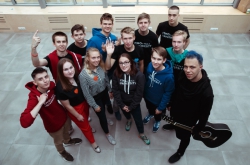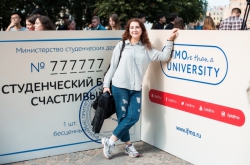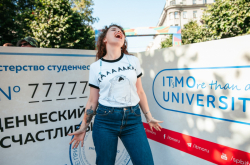Anton Akimkin, Chelyabinsk

Developed a control system for school students
I only learned about the contest when the application process almost came to an end, so I had about eight hours to write a motivation letter and come to St. Petersburg. I bought a ticket straight away, but I didn’t make it. When I came, it was too late, and the admission office was already closed. But I didn’t give up and found a person responsible for the admission campaign, and they gave me access to the system for half an hour so I could upload my portfolio. And I won.
There were not so many opportunities for those willing to learn programming languages in my hometown. There were courses in Pascal, but I was the only one attending. But I still loved programming and when the course ended I continued studying on my own and started programming in C.
Science, business, my own company? I don’t really think it’s my thing. But I would really like to launch a company producing innovative products that can make life easier. That was the purpose of my project.
Ekaterina Mashina, St. Petersburg

Developed an information support mechanism for prehospital care services
As a well-known saying goes, it is not a shame not to know, it is a shame not to learn. The same works for competitions. I think that it’s a shame not to try and I know that I would really regret it if I had an opportunity and didn’t use it.
I’ve always had time for both school and various projects. I used to come home from school, do my homework, and then do something else. I love trying new things and that was the best motivation.
I think that the Unified State Exam is a good tool to assess school students’ knowledge in every subject. But I don’t like the tasks and the structure of the exam. Maybe it would be better if there was an oral part, too.
I’m studying to become a system analyst, and I believe that in the future, this is going to be one of the most important professions. System analyst is a person who can code, but first of all, they write terms of reference for programmers. The thing is that programmers can write a very good code themselves but they may have problems organizing their work. I plan to further develop my project in ITMO Highpark, a new research, education and innovation center located in the southern part of St. Petersburg.
Ignatiy Ponomarenko, St. Petersburg

A second-prize winner of the ITMO VK Competition, invented a graphic editor
I advise everyone to take part in competitions and not be afraid to lose. Just try to convince yourself that the other participants are the same “dummies” as yourself. Even if it’s not true, it will make you feel more confident.
I think that school is more about learning the basics, such as math or the Russian language. One can’t underestimate the teacher’s role, but you are also responsible for what you learn.
Where to find motivation? I know a very simple system: just spend half an hour every day doing something you want to master. Just 30 minutes. It’s not that much, even if you have a busy schedule.
Talking about the professions of the future, I think it’s all about science and technologies. We can already see it now, that science and computers are becoming an integral part of our lives. I would like to become a game designer.
Nadezhda Maksimenko, St. Petersburg

Conducted a research project on microplastic in natural water systems
There is no point in being afraid. I took part in quite a lot of competitions, and I didn’t always win. I started with some local conferences and then applied for a bigger competition.
I have always been interested in ecology. This interest started when I was in third grade and began attending additional classes in ecology. In these classes, I learned a lot about nature and the way people interact with the environment. Back then, I already knew that I wanted to learn more about it.
I believe that science is the future, and it’s scientific progress that can save our planet for future generations. I want to become a researcher to make the world a better place.
Danil Zmievsky, Blagoveshchensk

Created a bilingual electronic dictionary of proper names
I graduated from a class with intensive foreign language training. I can’t say that I’m more into humanities or science. I’m probably one of those people who love both, and you can see it in my project: it’s a combination of linguistics and machine analysis which evolves around natural languages processing technologies.
Nowadays, there are not so many specialists in the field of computer linguistics. That’s why I think that it’s a very promising area. I’m not talking about anything in particular, but about a whole bunch of new professions that are only starting to emerge.
Do I want to work for a big corporation or a small startup? To be honest, I don’t care. The most important thing to me is what projects the company works on. As it often happens, smaller companies offer much more interesting and diverse tasks to solve rather than bigger corporations.
I think that it’s important to use all the opportunities you’re given. If you make a mistake, it’s not yours. But if you win, your efforts will be rewarded. That’s how I got here.
Alexandra Klebleeva, Tambov

The winner of the “Start your own business” competition
If you’re afraid of losing, just don’t tell anybody you’re going to apply. So if you lose, nobody will find out.
I’m studying to become an economist. Many people ask me why I chose this university if I’m not going to work with robots and AI, but to my mind, there will still be demand for people who can negotiate between customers and producers, and that’s who I’m going to be.
Elizaveta Punchenko, St. Petersburg

Participant of numerous scientific conferences, author of two State Commission for Academic Degrees and Titles-indexed publications
I am going to do research in the field of food technologies. In the words of our Rector, “love comes and goes, but food is eternal”. Jokes aside, I seriously believe that biotechnologies and science, in general, are the future because as food consumption grows, so does the number of related tasks: first, we have to make food safe, second, we have to make it accessible so that everyone could afford to eat.
What the food of the future will look like? I think that fundamentally, things will stay the same. But if we take cow milk, for example, there’s a high chance it will become an expensive and exclusive product. That’s why it’s our responsibility as scientists to prevent resources from decreasing or disappearing. My personal goal is to do scientific research, but I would also like to combine it with teaching if possible.
Alexander Blashenkov, Yuzhno-Sakhalinsk

Author of Straylight, an app for creating a company’s intranet system
If you find the thought of applying to contests daunting, you’ll just have to understand that nothing bad will happen should you lose. No one is going to punish you.
Above all else, school gives you an understanding of life in general. It’s not about swotting up on geography or any other subject; it’s about realizing what you’re interested in and what you want to do as your future career. School helps to find your own place in the world.
You can always find time for doing your own project. We were never that busy at school. But even if that wouldn’t have been the case, I still believe that everyone is perfectly able to dedicate at least an hour of their day to what they’re really interested in.
I don’t aim at working for Google. What I’d really like is to work in a small, dynamic team where there’s no red tape and everyone is free to suggest their own project.
Daniil Shakhbanov, St. Petersburg

Developed a membership test algorithm for free group elements
I wasn’t losing anything by applying to this contest; it would have been strange not to take this opportunity. I’m not a techie per se, but I find humanities more difficult and have a maths background, so I decided to pursue a tech degree in programming. I think that it offers me lots of opportunities as even now, programmers are one of the most sought-after specialists in the labor market; you can see that from the level of automation the industry has reached today.
Alexander Leader, St. Petersburg

Designed a robot that won the Control Award of the First Tech Challenge (FTC) Asia Pacific international robotics competition
It isn’t that difficult to find time for the project you’ve created: with the idea comes the desire to work on it. It’s even better if you’re surrounded by like-minded people: together you’ll bound to succeed even if you have nothing more than your enthusiasm. Thanks to school, I’ve made lots of new acquaintances and participated in many interesting discussions. I’m sure that all of my school friends will have outstanding careers.
I don’t think that the Unified State Exam is an accurate indicator of your knowledge and skills. Its main problem is that it’s really predictable: we go in there already knowing which tasks we’ll be faced with. That’s why whoever trained the most wins. If that hadn’t been the case, our school program would have been more diverse and in-depth.
It seems to me that many companies are heading to the direction of replacing workers with robots or programs. Even I got a chance to participate in such a project: we made a cashpoint for a taxi depot. This device could perform all functions of a cashier, so the company decided to decrease its cashier staff after we finished with our project. Many professions will disappear; we can already see it happening. But they will be succeeded by new jobs and new tasks.
In the future, I’d like to try my hand at working on different projects in the sphere of business processes automation and developing solutions to specific business problems. Working on your own start-up essentially means sticking to one project only. Personally, I like having lots of projects to juggle between; it’s much more interesting that way.
Evgeny Dolgosheev, Vladivostok

Created a ‘Noughts and Crosses’ console app and implemented it the C++ programming language and ‘Evolving Missiles’ app in the JavaScript language using the p5.js library
Before you venture in starting your own project, you have to understand your reasons behind it. After that, you have to set interim goals that will advance you in your work. You won’t be able to succeed without a clear-cut plan.
I started my project because I wanted to make my ideas reality, and I was lucky to find people who shared my vision, which helped me go further. You’ll find the time and opportunities will come your way if you have the desire to achieve something. It’s not that hard to find like-minded people as you might think, and being in a team is a great motivation.
Alexander Dupak, St. Petersburg

Developed a universal robotics-powered platform for gathering intelligence
It’s hard to predict which professions will be the most relevant five or ten years from now. But I chose robotics, because that’s what interests me most. When I first started exploring this sphere, I quickly saw some real results, and this strengthened my intent to keep on improving my knowledge and skills.
School taught me to do everything on my own and continue learning in my free time. I don’t think that the Unified State Exam results define your abilities. It’s no more than a set of rigid formal criteria that aren’t enough for evaluating your potential.
Sergey Fedorov, St. Petersburg

Finalist of Sberbank’s AI hackathon for students and laureate of Sakharov's Readings, an international scientific conference for high-school students
School taught me literally everything, even beyond the school program: I think my knowledge of maths will be enough to see me through the first year of university at least. I also saw it as a kind of career guidance center that helped me realize what I want to do with my life.
If we talk scientific trends, I think that physics-wise, they’re not that easy to define. There’re some breakthroughs, but it’s far cry from what’s happening, for example, in bioinformatics. IT continues to develop at a cosmic speed; there’s lots going on in the spheres of information security and encrypting.
Launching your own startup is all the rage right now, everybody’s dreaming about it. But you have to understand how this all works before going in there. My plan is to work at a big company first to learn the ropes. I’d like to do something related to science.
Daniil Nechaev, St. Petersburg

Winner of the World Robot Olympiad 2017
Knowledge for me is an ability to solve tasks using all the tools you’ve got at hand, Internet included. All the projects at ITMO creative laboratory are done by people who know how to source information and understand how to apply it. Obviously, you need to have a certain theoretical base to know what to google. But it is the ability to search for information that I find the most valuable.



